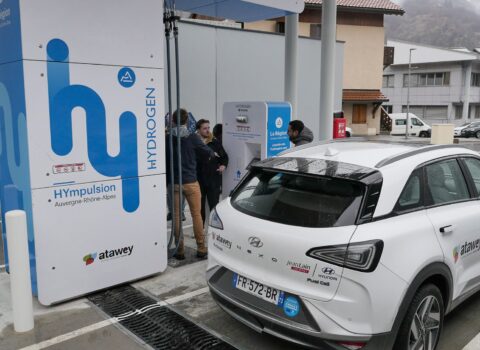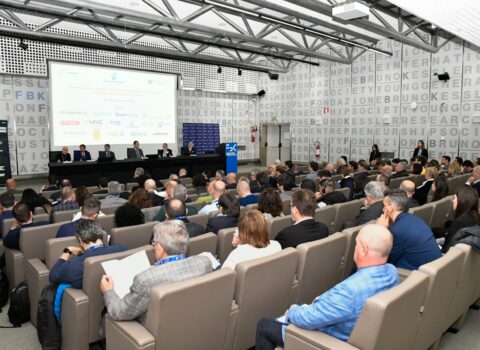
Paving the Way for a Hydrogen-Powered Future in the Alps
The Midterm-Conference of AMETHyST Project
The AMETHyST Project’s mid-term conference, “Hydrogen for the Future of the Alps,” brought together local and European leaders, researchers, and industry experts to discuss the critical role of hydrogen in advancing a sustainable energy transition in the Alpine region. The presence of Key stakeholders was also the occasion to launch the SkHyline platform, a collaborative initiative designed to unite efforts across regions, fostering knowledge-sharing and accelerating hydrogen deployment in sectors essential to the Alpine economy, such as transport, industry, and tourism.
Hydrogen as a Pillar of Alpine Sustainability
The conference underscored the growing potential of hydrogen as a flexible, clean energy source uniquely suited to meet the specific needs of the Alpine environment. Hydrogen is viewed as a fundamental pillar for decarbonizing energy-intensive sectors and creating a sustainable, self-sufficient ecosystem for transport, tourism, and heavy industries in mountainous areas. Highlighted projects and strategies showcased how hydrogen can contribute to reduced emissions, particularly in traditionally challenging sectors like heavy mobility, industrial applications, and remote energy access.
Building a Local Hydrogen Ecosystem
A wide range of stakeholders from Trentino public and private sectors discussed about the potential, current situation and local synergies for hydrogen in the region. Infrastructure are being created for large H2 plants, projects are being implemented in collaboration with multinational companies, innovative systems have emerged and are being tested in industries. It is clear that expectations and interest in this energy vector are high. Network, policies and fundings are needed to place the various stakeholders on the entire supply chain.
AMETHyST is developing a holistic approach to hydrogen, envisioning an ecosystem that integrates production, storage, transport, and multi-sector applications. Notable initiatives include the establishment of “hydrogen valleys” for industrial clusters, hydrogen-fueled transport networks, and eco-friendly energy solutions for tourism infrastructure. Large projects representatives brought their experiences and expectations, as well as challenges and solutions. The Alpine region’s unique environmental challenges make hydrogen an ideal energy vector, with projects aimed at powering snow groomers, boats on Alpine lakes, and even supporting grid stability through energy storage.
A Call for Cross-Regional Collaboration and Policy Support
The Alpine macro-regional strategy provided the political foundation for the conference, with representatives advocating for policies and funding to advance hydrogen initiatives. Presenters emphasized the importance of a unified, cross-regional framework to foster public-private partnerships, incentivize renewable hydrogen projects to address the high upfront costs and technical complexities of hydrogen infrastructure, but also the need to raise awareness to promote public acceptance and improve skills through trainings. In this context, the newly launched SkHyline platform will facilitate ongoing collaboration, providing a structured network to support innovation, resource-sharing, and coordinated project development across borders.
Challenges in Hydrogen Deployment
A recurring theme throughout the conference was the challenge of scaling hydrogen technologies due to high production costs and limited existing applications. The need for financial support mechanisms and market incentives, for clear regulatory standards and certified operators emerged as critical factors to enable cost-effective hydrogen adoption. Experts from both local and European levels called for long-term investment strategies and cohesive policies to create demand and reduce economic risks for early adopters, as the current high cost of hydrogen technology presents a barrier to widespread deployment.
Education and Awareness Initiatives
The increasing interest and number of activities with hydrogen showed the need for skilled and trained workers in all fields that will need to deal with this vector through the entire supply chain. There is the need for continuous learning, during university but also within companies and through synergies with sectorial associations.
Recognizing the need for greater awareness and of educating policymakers, industry stakeholders, and the public on the benefits of hydrogen as part of the Alpine region’s clean energy future. Knowledge dissemination is central to AMETHyST’s objectives, ensuring that decision-makers understand hydrogen’s role in reducing greenhouse gases, boosting energy independence, and fostering sustainable growth.
Conclusion of the Conference
The “Hydrogen for the Future of the Alps” conference concluded with a resounding consensus on hydrogen’s potential as a transformative energy source for the Alpine region. The event highlighted the collective ambition to overcome technical and economic challenges through coordinated action, knowledge-sharing, and supportive policy frameworks. With the establishment of the SkHyline platform and the strong backing of regional governments and industry partners, the Alpine hydrogen community is well-positioned to lead Europe’s transition to a resilient and sustainable hydrogen economy.




